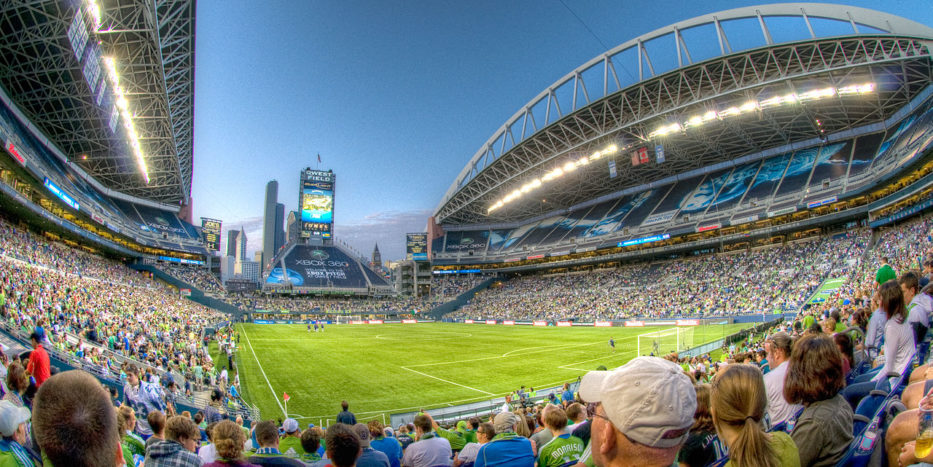
Pictured is CenturyLink Field, home of Seattle Sounders FC. Will the Sounders and the rest of the MLS actually see action this year? Photo/Wikimedia
[dropcap]T[/dropcap]alks between the MLS Players Union and owners of all 20 MLS clubs continued on Tuesday in Washington D.C. as hopes for avoiding a strike have started to dwindle.
Today’s meetings mark the final day of three marathon sessions between the two entities with little happening. While it’s still unclear as to where each side stands, we do know what the major issues are. Instead of us speculating on what is going on in a room that is on lock down, let’s fill you in on what the issues are at hand and how they truly differ from the rest of the world.
Q: What is the main problem that is causing this possible strike?
A: That’s a very loaded question, but it comes down to three primary topics: Free Agency, Salary Cap, and Minimum Salaries.
Q: What does each side want?
A: The Union wants an increase in both the salary cap and minimum salaries. The current salary cap is just $3.1 million, with no single player allowed to make more than $387,000. This, of course, does not include “DPs” or Designated Players, who can be paid any amount and it does not go against the salary cap. A team currently is allowed to have three DPs on their roster.
Q: How would free agency work in soccer?
A: This is the hardest point to truly figure out. There are two major problems with this: MLS is a single entity and no other league in the world does free agency in soccer. The two-window transfer system is always about buying and selling players between clubs.
Q: Wait, a single entity?
A: MLS operates a single entity. In other words, MLS owns all of the contracts of players instead of the clubs. Clubs still make the moves for players in regards to selling and buying, but MLS ultimately owns every player in the league.
Q: This seems really strange. Europe doesn’t do this, right?
A: Correct. In fact, the rest of the world looks upon this system and probably thinks it’s borderline nuts. There’s no such thing as a players’ union in any major league in the world….except for MLS. Of course, we’re sticking to just soccer leagues. Transfers are the only way to do business in the rest of the world.
Q: Why does MLS do it differently?
A: The bottom line is that it’s the only way MLS really can operate without cannibalizing itself. It’s also done to try and keep parity in the league so that teams are balanced and all have a fair shake at the end of the day. If there wasn’t a single entity system with a salary cap, big market teams would more than likely dish out far more cash than other clubs and buy whoever they wanted. MLS as we know it would not last long in that system.
Q: Is it even possible to do free agency with single entity?
A: There may be a way to work it out. The players seem to think so. The owners are skeptical. Honestly, it would be extremely difficult to do. With MLS being the one who owns all contracts, would it just be a bidding war between clubs? Would there be only one time of the year that it could happen? These are questions that have to be answered in these meetings.
Q: When is the deadline for all of this?
A: Technically speaking, the deadline for a new CBA is March 6, 2015. However, if nothing is in place by Wednesday night, chances are high the strike will already be in the works. Teams are not allowed to travel until some form of a CBA is in place, meaning the openers set for Friday night are probably not going to happen.
Q: Who is to blame for this?
A: That depends on who you ask, but it’s hard to truly point blame at anyone. The players have an extremely valid point in that minimum salaries are somewhat of a joke and it should be bumped up. The salary cap probably needs to be raised as well. These two things are more than likely going to happen. The true sticking point is going to be free agency.
Q: What’s worst case scenario for this?
A: The strike wipes out the season. I don’t believe that this will happen, but if the players really want to dig their feet in on free agency, then this is possible. The owners may need to realize this and come up with some form of the system.
Q: How about a little optimism? What’s best case scenario?
A: I think at this point, best case scenario is that we lose a couple weeks of matches and the season gets rolling in mid-March. An eleventh hour deal could ultimately happen but is not very likely, given all that has come out over the last few weeks.
Q: How badly would a strike hurt MLS and its popularity?
A: A lengthy strike could be fatal to the league, in all honesty. The sport continues to grow, but a lengthy work stoppage would kill whatever momentum has been built up in the last several years. If the strike is short, then the damage would be minimal. Any type of a strike could do some major harm to the expansion clubs in Orlando and NYC.
Q: You mentioned Wednesday as when we’ll probably know. Why?
A: Talks will break down at that point. Everyone expects to hear that nothing was truly solved on Tuesday and that an emergency meeting on Wednesday may be agreed upon. If we get nothing after tomorrow, expect a strike.
Editorial note: We will have any updates posted as they become available. Also, Damien and myself will discuss this on a new episode of “Upon Further Review” as we’ll go more in depth with some of the issues.




